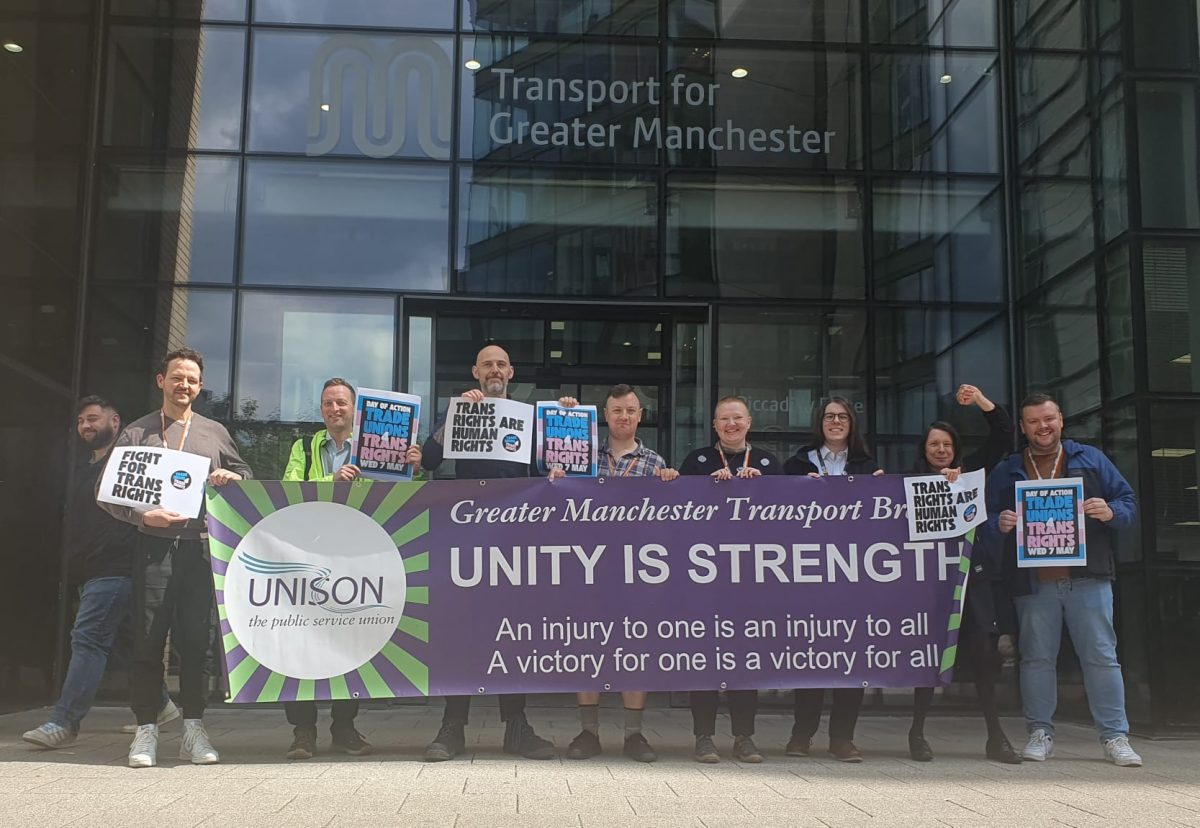
Fighting for trans people at work and in unions – and winning
Unite Aerospace Rep •A Unite aerospace rep writes about how union members in his workplace defeated a transphobic attack after the Supreme Court judgement. Supporting trans people isn’t just vital for trade unionists – raising political issues like this can help build workplace organisation.
The Supreme Court ruling has sparked protests against transphobia across Britain. Marches from London to Orkney have been followed by workplace protests and sit-down actions in stations. Labour is going along with the far right, with Trump and Farage as they attack trans people and migrants, paving the way for broader attacks on LGBTQ and racialised people. Now the biggest Prides, including London, Manchester and Brighton, have banned Labour and other political parties (including trans-friendly ones, unfortunately) from their events.
The 25,000-strong march in London was supported by unions including the Communication Workers Union (CWU), the performing arts and entertainment union Equity and the college and University and College Union. Militant grassroots unions like the IWW, the IWGB, the Sex Workers Union and UTAW also backed the action. A workplace day of activity called by Trade Unionists for Trans Rights on 7 May was supported around the country, including by UNISON members at Transport for Greater Manchester, who staged a protest outside their building with a banner.

Union support for this emerging radical movement is a new and welcome development. Links between queer people and organised workers have a long history, including the well-known example of Lesbians and Gays Support the Miners in 1984-5. LGSM’s work won over many unions to stronger support for LGBTQ people, and those unions pushed the Labour governments of 1997-2010 to introduce laws giving queer people something like legal equality.
We need to remember that legacy now. The EHRC was quick to follow up the Supreme Court ruling with the ‘guidance’ produced in haste on Friday 25 April. EHRC Chair Kishwer Falkner, appointed by Liz Truss, is eager to pursue a right-wing culture war agenda. MPs are now briefing against Falkner in the media and hoping to distance themselves from the EHRC, but the right-wing media is still running transphobic articles every single day .
In my workplace – management attacked our trans colleagues
I work for a major transnational aerospace company that prides itself on having LGBT and Disability inclusion networks. It also recognises Unite, which has had no engagement with these networks as we’ve viewed them as public relations exercises, or in the case of the company LGBT network, a pink-washing initiative. The network’s motto is ‘nothing without us’, which is now severely being put to the test. The company set up what they termed ‘consultations’ with the LGBT network to find out how trans people felt about the ruling. Regardless of the views of the trans workers, the company issued a draft statement that said they would implement changes to toilet and changing facilities in line with the interim guidance from the EHRC. They said they had received legal advice which instructed them to make the changes! The trans activists were upset and furious. The ‘nothing without us’ motto was, as we suspected, just a public relations exercise. The trans activists accused the company of pink-washing them, and wanted to know from the company what the union was saying. They got no answers and some of the LGBT network, including the trans co-chair, joined Unite.
Union reps challenged the company
Unite reps had already challenged the company on their interpretation of the ruling and had insisted on being involved in a genuine consultation about any proposed changes or statements to the workforce. When we saw the statement we made the following points:
- The EHRC interim guidance is incoherent and not legally binding. It’s unworkable and is likely to be challenged.
- The ruling does not say anything about toilets – it is a contested matter.
- On single sex spaces, the ruling does not mandate (but only permits) trans exclusion.
- The use of disabled toilets would impact disabled employees and also undermine the dignity of the trans community as being trans should not be treated as a disability.
- Excluding trans people from toilets is likely to result in discrimination against people on the basis of gender reassignment and validate harassment in the workplace leading to a multitude of claims against the company.
- There is no way to enforce toilet rules that does not violate the dignity of trans workers, and it is not reasonable to expect any other worker to police toilet access.
- How did the company plan to deal with any employee who transgressed their ruling? Would they discipline someone or call the police?
It’s important to understand that the EHRC interim update has no legal force. It is only the EHRC’s initial opinion on what the law now requires, following the Supreme Court’s judgment. By opposing attempts to implement the interim guidance now we can stop unnecessary measures being implemented that will harm trans people and help shape the outcome of the consultation.
Managers backed down – now we have to build a campaign
The company backed down on implementing the changes to facilities and haven’t issued any statement. They have since agreed to participate in the consultation over the implementation of the legislation via their employer’s federation, and will open this consultation up to the wider workforce with a questionnaire. They have agreed that the union can help shape the questions.
However, they say that they still want to implement changes in line with the interim guidance at the end of June, though they have agreed to consult further with us prior to then. So, we have a month to build a campaign of resistance at work. The co-chair of the company LGBT network has been elected as a Unite rep to specialise on LGBT+ equalities issues. The new rep made us aware that it’s Pride month this June and that the company has been repeatedly cutting the budget of their LGBT network. So, our new LGBT rep attended the Unite branch last week and the branch unanimously agreed to fund LGBT material for Pride month and beyond.
Our new LGBT+ rep has been elected to the Scottish LGBT+ committee and the Scottish Aerospace and Shipbuilding regional industrial sector committee.The plan is for them to learn about and share best practice while trying to shape our response throughout the union in Scotland. Meanwhile, the company has shifted from their earlier horrific and incoherent position – but the movement on the streets and in workplaces is going to be the key to where we end up with this pernicious judgement and any follow up guidance.
Unions must support trans people
We’ve seen varying responses from union leaderships since the judgement. UNISON, after a weak initial response, has taken a firmer if still inadequate position in support of trans people. This is important, because facilities in public sector workplaces will be used by the public as well as workers. Supporters of the judgement will no doubt focus on the NHS and local authorities as they seek to further marginalise trans and non-binary people from public life. The UCU has taken a firmer position from the outset and their policy conference recently passed motions supportive of trans people to reaffirm and strengthen their position.
In my own union Unite, there’s been a holding position which hasn’t been updated in the month since the controversial guidance was issued. And some union leaderships have taken appalling positions. At the PCS conference the key pro-trans motion was removed from the agenda after officials claimed that they had received ‘legal advice’ making this necessary. Any seasoned union activist knows that legal advice always says ‘on the one hand this and on the other that’. You can typically get legal advice to support either interpretation of the ruling and interim guidance. The decision by the PCS leadership to remove motions pertaining to trans rights is a political decision and one that will have the effect of boosting transphobes in the union while undermining already marginalised trans and non-binary members.
We need political unions
Over the last twenty years many corporations have developed diversity, equalities and inclusion policies and staff LGBT networks. These have had a high profile on some Pride marches, such as London and some in Scotland. Now that oppressed people such as migrants and trans people are under attack, and the political consensus in favour of diversity is fraying, many corporations are retreating on those commitments. It’s now clear that unions can bring cis and trans members together to fight this roll back on inclusion and resist the attacks on equality at work and in the wider labour movement. The key ingredient to success will be allowing new trans activists to take a lead in these campaigns and for cis union activists working with them to listen to and support the concerns and ideas that trans union members develop to organise resistance.
Our recent successes also reflect the importance of not ducking political issues at work. We’ve been rebuilding the union and have grown by over 100% in the last 18 months. We’ve won various industrial battles along the way. To help us achieve these successes, we’ve refused to avoid difficult or polarising political issues and have built a reps committee which supports Medical Aid for Palestine and is pushing for our union to implement a serious Boycott and Divestment campaign against the genocidal Israeli regime. Taking up these issues has allowed us to reach into groups of young workers who don’t necessarily see trade unionism as being relevant to them. We’ve also been able to attract some of the brightest, most talented and courageous new young activists to the reps committee. Our next aim is to replace the company network with our own Unite LGBT+ network in the factory and wider company.
Workplace activism makes a difference
Union policies affecting trans workers can often be determined by the political complexion of the union’s leadership – but workplace activists taking action in support of trans people, and making a direct impact in workplaces, also has an impact. The right to feel safe and have dignity in the workplace is an issue that trade unions have fought for against employers since their formation. How can trans people work if they’re unable to do so with dignity, in safety and with proper facilities? The workplace is one of the most important battlegrounds for trans rights.
The Supreme Court ruling is an issue for every trade unionist. If it’s allowed to pass unchallenged, trans women would not be entitled to make equal pay claims, use appropriate toilets in the workplace, or make sex discrimination claims. It would remove the ability of trans people to gain legal recognition of their gender identity. The fight for trans rights at work is a battle that impacts all workers and is one that socialists and trade unionists should be at the forefront of leading.
Edited to more accurately describe UNISON’s current position, and the actions of national officials at PCS conference, 9 June 2025







0 comments